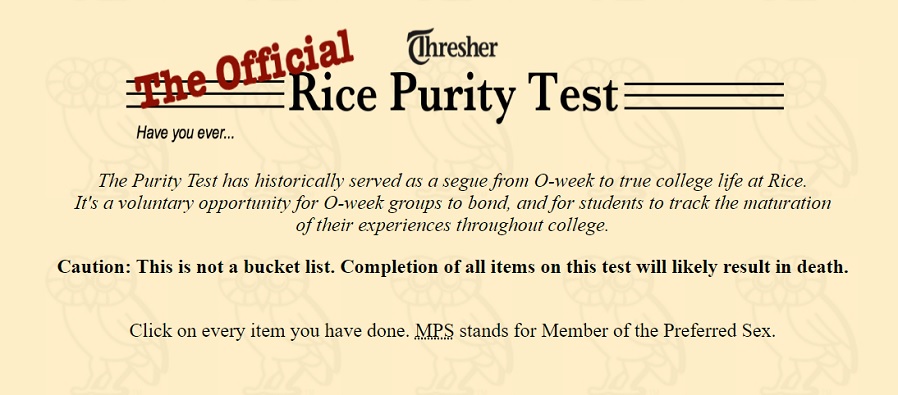The Rice Purity Test is a popular self-assessment tool used by individuals, particularly college students, to gauge their level of innocence or experience. It consists of a series of questions that cover various aspects of life, including relationships, sexual experiences, and substance use. Question 69 is often considered one of the most intriguing and talked-about questions on the test. In this article, we will delve into the details of Question 69, its significance, and the implications it holds.
Rice Purity Test
The Rice Purity Test originated at Rice University in Houston, Texas, and has since spread widely across college campuses and online platforms. It is designed to assess a person’s purity level on a scale of 0 to 100, with 0 being the least innocent and 100 representing complete purity. Participants answer a series of questions honestly and calculate their final score to determine their level of innocence according to the test’s criteria.

Significance of Question 69
Question 69 on the Rice Purity Test focuses explicitly on sexual experiences. It aims to uncover whether the test-taker has engaged in any form of sexual activity. This question holds significant importance due to the connotations and associations surrounding the number 69 in popular culture, which often relates to a particular sexual position.
Interpretation of Question 69
The interpretation of Question 69 can vary depending on the individual’s perspective. For some, it may simply be a question about their sexual experiences and whether they have engaged in any activity. Others may interpret it more explicitly, associating it with the sexual position called “69.” It is essential to understand that the interpretation may differ among individuals, and the context in which the question is asked may influence their responses.
Common Reactions to Question 69
Question 69 often evokes mixed reactions from test-takers. Some may find it amusing, while others might feel uncomfortable or embarrassed when confronted with such a personal and intimate question. The question’s nature and the potential associations with sexual activity can create a sense of vulnerability and self-reflection.
Exploring the Impact of Question 69
The impact of Question 69 extends beyond the Rice Purity Test itself. It reflects the broader societal attitudes towards sexuality and the cultural significance placed on particular sexual acts or positions. The inclusion of this question in the test raises questions about how society perceives and judges individuals based on their sexual experiences.
Personal Reflections and Societal Views
Question 69 invites individuals to reflect on their own experiences and consider how they align with societal norms and expectations. It can spark internal dialogue about personal values, boundaries, and the influence of peer pressure or social constructs on one’s choices. Additionally, it highlights the importance of open conversations about sexuality and the need to address any discomfort or shame associated with sexual experiences.
Strategies to Address Question 69
For those who find Question 69 challenging or uncomfortable, it is crucial to approach the topic with empathy and understanding. Encouraging open and non-judgmental discussions about sexuality can help create a supportive environment for individuals to express their thoughts and experiences. Education and awareness campaigns can also play a vital role in dispelling misconceptions and fostering healthy attitudes toward sexual relationships.
Question 69 on the Rice Purity Test holds a significant place in popular culture and self-assessment. Its association with sexual experiences and the potential connotations of the number 69 make it a topic of intrigue and curiosity. However, it also provides an opportunity to reflect on societal views, personal boundaries, and the importance of open discussions about sexuality. By fostering understanding and empathy, we can create a more inclusive environment where individuals feel comfortable exploring and expressing their own experiences.
FAQs On Rice Purity Test
Is the Rice Purity Test an accurate measure of a person’s purity?
The Rice Purity Test is not a scientifically validated assessment tool. It is primarily a fun and informal questionnaire that individuals use for self-reflection and entertainment purposes.
How should I interpret my score on the Rice Purity Test?
The interpretation of the Rice Purity Test score is subjective and varies from person to person. It’s essential to remember that the test does not define your worth or character. It’s merely a collection of questions intended for personal reflection.
Does answering Question 69 negatively affect my score on the Rice Purity Test?
No, answering Question 69 does not inherently impact your overall score on the Rice Purity Test. The test evaluates your responses across multiple questions, and your score is calculated based on the entire questionnaire.
Can I skip Question 69 if I feel uncomfortable answering it?
Yes, you have the choice to skip any question on the Rice Purity Test, including Question 69. It’s important to prioritize your comfort and only answer the questions you feel comfortable with.
Is the Rice Purity Test suitable for everyone?
The Rice Purity Test may not be suitable for individuals who are sensitive to explicit or personal questions about sexual experiences. It’s important to assess your comfort level before taking the test.
